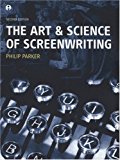 I first encountered screenwriting teacher and script consultant Phil Parker at a workshop for the shortlisted candidates of Northern Film and Media’s Maxi Stinger scheme. I had to leave early to pick up my daughter from daycare, so unfortunately missed the last 90 minutes of the workshop. So I decided to get Phil’s book The Art and Science of Screenwriting to see what I’d missed. I’m so glad I did.
I first encountered screenwriting teacher and script consultant Phil Parker at a workshop for the shortlisted candidates of Northern Film and Media’s Maxi Stinger scheme. I had to leave early to pick up my daughter from daycare, so unfortunately missed the last 90 minutes of the workshop. So I decided to get Phil’s book The Art and Science of Screenwriting to see what I’d missed. I’m so glad I did.
Phil is a producer and freelance development consultant whose clients include Aardman Animation (Wallace & Gromit: The Curse of the Were-Rabbit) and The Mob (Terry Pratchett’s Hogfather). He is the founder and Course Director of the MA in Screenwriting, at London College of Communication, University of the Arts, London.
About The Art and Science of Screenwriting
The Art and Science of Screenwriting is a fairly dense text and quite ‘academic’ in tone. But don’t let that put you off. If you’re an absolute beginner, this book might not be for you, but if you’ve penned a screenplay or two and are ready to redraft them, it will be very useful. Although he does discuss short film and documentary, his main focus is the dramatic feature.
Although initially confusing, I found his presentation of what he refers to as the ‘creative matrix’ extremely useful in understanding the interplay of genre, style, form, plot, story and theme. It has helped me look at my current feature script in a new light, and I’m reworking it accordingly.
His chapters on ‘from stories to themes’, ‘revealing form and plot’ and ‘explorations of genre and style’ helped me to see what kind of film I was developing and how to identify which areas needed to be strengthened, particularly with regard to characters embodying a theme.
His discussion of rhythm and tempo (within and between scenes) was very useful, as were his tips for troubleshooting problematic structures. This is a book that will help you to see what is working in your screenplay, what isn’t and why. But what it won’t do is the rewrite, that’s still up to you.

I’ll have to look out for this. So far, the book on this subject that has influenced me most is Robert McKee’s STORY. The other big influence on the way I look at screenwriting is a DVD – THE HERO’S 2 JOURNEYS by Hauge and Vogler – particularly Vogler’s part.
But the absolute best ever thing I did in learning about screenwriting was signing up on a film making course and making my first short. Until then, I had still been thinking as a novelist.
The unexpected thing (to me, anyway) is that making films has changed my approach to prose fiction writing.
Hi Rod. I tried ordering a copy of the Vogler book but it was out of print. Didn’t know it was on DVD, will hunt that down. Still haven’t read ‘Story’ although everyone tells me I should! It’s on that ‘to do’ list.
I had the same experience as you regarding screenwriting influencing my prose. But I also realised that my prose writing had always been screenwriting in disguise anyway. My breakthrough in film came after I’d written a series of children’s picture books and realised that despite my belief to the contrary, ‘visual’ writing came naturally to me. It was after that that I had my first script produced.